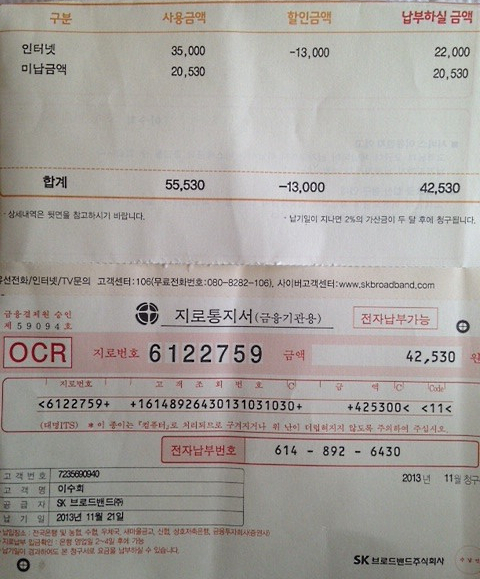aNewDomain.net — In South Korea Internet speeds and services are miles ahead of the U.S. My son, the source for my intel, lives 50 miles away from Seoul in a small city and has a prime example for us.
ISP Competition
There are three major ISPs he can choose from and a number of smaller more-local outfits. The prices below are all for a symmetric 100 Mbps connectivity to the Internet:
- SK Broadband: 35,000 Won
- LG Corp: 31,350 Won
- KT Corp: 31,680 Won
For perspective, $1 comes in at just under 1,000 Won — about 96 cents (at the time of writing). So, each of these plans is roughly $30 a month.
Let’s take a look at the latest Internet bill, provided courtesy my son. He’s with SK Broadband:

Image credit: Larry Press
In the top line we see his monthly charge, while the second line indicates the previous month’s charge. 35,000 Won is the total charge for this month, and 13,000 Won is taken off due to a two-year contract. That model is used in the U.S. frequently and provides discounts on phone plans and Internet services for corporate loyalty.
Essentially, my son signed a two-year contract to receive 100 Mbps connectivity for roughly $22 a month.
What are your Internet costs? What speeds do you have? Granted, the $22 a month is just for Internet. It is not packaged with HBO, landline or TV services. Regardless, my son’s rate outpaces U.S. ISP costs by miles.
Customer Service
The ISPs in South Korea are fiercely competitive, extending this aspect into their customer service. A quote from a comparative review of South Korean ISPs says:
As mentioned earlier of fierce competition between a much-similar service providers, they will dispatch a repairman within a few hours of your call, even on WeekEnd!”
How did Korea create such a competitive ISP market?
The answer is not simple. One key component is that the government has created a common infrastructure for ISPs, making them compete in other locations such as Sweden, Singapore or Latvia for instance. Also, the government has pursued a complex and robust investment and creation structure, encouraging easy access and healthy competition as a result.
In contrast, the U.S. has weak ISP competition. This puts customers in a bad position, essentially receiving slow Internet for exorbitant prices. A necessary service needs to have healthy competition, or consumers like us will suffer.
For aNewDomain.net, I’m Larry Press.
Based in Los Angeles, Larry Press is a founding senior editor covering tech here ataNewDomain.net. He’s also a professor of information systems at California State University at Dominguez Hills. Check his Google+ profile — he’s at +Larry Press — or email him at Larry@aNewDomain.net.













Apparently the US would rather burn through billions of dollars year after year on shear waste and frivolous programs that show no results then to INVEST in ANY kind of infrastructure unless its for ways to spy on its own citizens!
The US telecom industry has seen real competition elsewhere in the world and have run screaming from it, back to their safe territories in the US where they have their government sanctioned and taxpayer subsidized monopolies.
[…] cost down and quality up. If I could easily switch between several fast, reliable ISPs – as my son who lives in Korea can – I could vote with my dollars. So could you. And you’d have options that didn’t […]